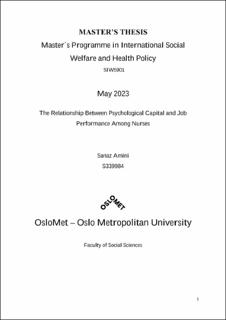The Relationship Between Psychological Capital and Job Performance Among Nurses
Abstract
The nursing job has always been physically and emotionally challenging. Nurses as a in front line health care providers, have a direct impact on patients and it is vital to do their jobs as best as possible. Therefore, increasing job performance should be under consideration. There are many ways to increase job performance such as lower working hour, better income, and increasing psychological capital. Several articles have argued the effect of psychological capital associated with several workplace outcomes. There is a growing interest for researchers to study about if psychological capital is a truly measurable aspect associated with several workplace outcomes such as absence from work, job performance, and job satisfaction or not.
This thesis is a literature review with aimed to investigate the relationship between psychological capital and job performance among nurses and importance of other variables in the relationship between these two.
Findings of the review seems to suggest that there is a positive relationship between psychological capital and its components such as self-efficacy, hope, optimism, and resilience and job performance, except for one study which has indicated that resilience and job performance are not related. In addition, findings support the role of age and job embeddedness in the relationship between psychological capital and job performance. This thesis also suggests conducting a longitudinal study to assess the relationship between psychological capital and job performance, and given importance of mediating and moderating variables in future studies.
